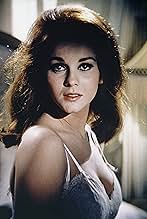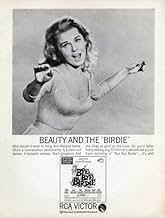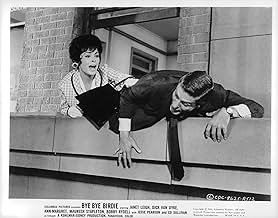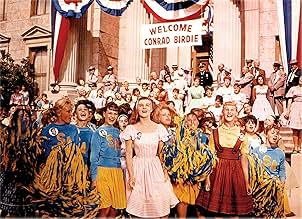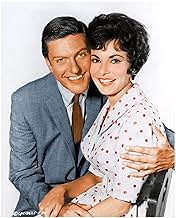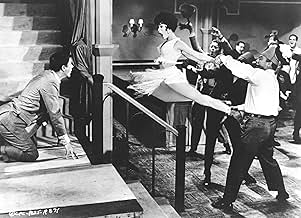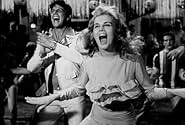IMDb-BEWERTUNG
6,6/10
9878
IHRE BEWERTUNG
Ein Rocksänger reist in eine kleine Stadt in Ohio, um seinen "Abschied" im Fernsehen zu feiern und seinen größten Fan zu küssen, bevor er eingezogen wird.Ein Rocksänger reist in eine kleine Stadt in Ohio, um seinen "Abschied" im Fernsehen zu feiern und seinen größten Fan zu küssen, bevor er eingezogen wird.Ein Rocksänger reist in eine kleine Stadt in Ohio, um seinen "Abschied" im Fernsehen zu feiern und seinen größten Fan zu küssen, bevor er eingezogen wird.
- Regie
- Drehbuch
- Hauptbesetzung
- Für 2 Oscars nominiert
- 7 Nominierungen insgesamt
Empfohlene Bewertungen
Instead of an adaptation of the original musical, it might be better to think of this movie as "A Variation on the Theme of Bye Bye Birdie." I've loved it since I was a kid and I don't really care how much or how little it's been changed. As a work standing on it's own it is wonderful, goofy, and good fun. An excellent piece of musical film-making. The casting is superb and I still laugh throughout the movie. Dated? Somewhat. Perhaps only superficially. 'N Sync was just in town and their effect here makes me think there's something fundamentally timeless about the behavior of teenage girls. I've heard it was the same when Frank Sinatra was a young singer. And there may be something timeless about us guys too... I'm still a sucker for the beginning and ending with Ann-Margret singing. She opens the movie sounding like a whining petulant little girl and at the end her reprise is as a worldly sophisticated sex-kitten. Just too cool.
The vitriol below from fans of the Broadway original is absurd. Yes, this is not a filmed version of the stage play - GET OVER IT! What we have is a funny, smart, classic film musical that gets virtually everything right. Dick Van Dyke reprises his Broadway role while at the peak of his career, Paul Lynde gives his best film performance, Maureen Stapleton milks her part for all it's worth, and Ann-Margret is simply astounding! The only casting error is Janet Leigh - but they needed a name, since everyone else in the cast was unknown at the time. While Leigh gives a solid performance, songs had to be cut since she could sing only with difficulty. But this is a minor flaw - everything else about this film is spot on, as demonstrated by the sad effort to redo it for TV in 1995. It captures the era perfectly - of course, it's dated: it's about America in the early 60s! If it wasn't dated, it wouldn't work! So if you haven't seen it, get it - I just watched in in NYC's Bryant Park with thousands of jaded New Yorkers, and it won over that audience completely. Enjoy!
I tend to agree with Alice from Orlando regarding this film. While "Bye Bye, Birdie" is a terrific film with terrific performances, viewed today, it's also a tribute to an era that we'll never get back. I completely agree with those historians who feel that 1953 - 1963, the ten year period between the end of the Korean War and that dark day in Dallas, was the last real "Era of Good Feeling" in American history. By and large, we knew who we were, what we were, and where we were going. Then came political assasination, the "Summer of Love," Viet Nam, Watergate, et. al., and we have a society that's not sure of anything anymore. Happily, there are films like "Bye Bye, Birdie," made during the apex of the 1953-63 period, to remind those of us who came of age during that era what we've lost, and to show those who weren't there what it was like. Would that we all had a Sweetapple, Ohio, to go back to again.
This musical, for those of us who were of the age then, represents a time and a place we thought would not end. Entering our early teens in suburbia, begat of young war veterans, the biggest issues in our lives were those reflected in this film; who pinned who and the adulation of our musical icons. The whole world was Sweet Apple and "someday we would find out this was what life was all about" as Kim sings to a befuddled Hugo. Even nerds could fall in love. And an equal force in our weekly lives was the Sunday ritual of The Ed Sullivan Show. This is a beautiful homage to that world that would end seven months later in Dallas and bring with it the counter culture, riots and Viet Nam. Hard to put on a happy face... But you will with this score. More fifties and Bosa Nova then the hip sixties it is toe tapping and gets under your skin. Worth repeat viewings. And as always "I gotta be sincere..if you feel it in here.." and I still do.
With the gift of a DVD by a good friend, I have now viewed BBB for the first time in over 20 years. And the comments here astound me: so many people coming to a message board to complain on a film that isn't a stage show. Or a book. Or an editorial. Different media sometimes (not always, to be sure) necessitate a change or alteration in a story adaptation. Yes, Rosie's ethnicity is down pedaled in the film (mainly because Chita Riviera wasn't in it), but they don't eliminate it entirely by the inclusion of a hideous black wig on Janet Leigh. I didn't miss Albert not being an English teacher as opposed to a chemist at all; it doesn't change the essence of his still-henpecked-by-his-mother character. On a different matter, I'm a little surprised to learn that Dick Van Dyke apparently had a bruised ego because of the strong emergence of co-star Ann-Margret in the film (his name still comes before hers, f'heaven's sakes!), but what can you do? The film is a fun, bright, pseudo-satire of the generation gap, teens, Elvis, and most of all, Ed Sullivan!! The finer numbers include the A-M introduction in "How Lovely to be a Woman" followed by the insane ensemble piece "Sincere-" which contains one of the funniest closing camera pans ever used in a film. "Kids" is also fine, but "Put on a Happy Face" is hampered by the limited dancing ability of Janet Leigh- through no fault of her own, mind you, but an obvious hole in what should have been a boy-girl dance duet (which they try to hide with excessive trick camera effects). The film's standout number, IMO, is "A Lot of Livin' to Do-" a nightclub extravaganza sung by THREE different leads advancing two different plots of the story at once. With stellar direction by George Sidney and inventive choreography by Onna White, it first appears as a conventional girl-swooning solo for the title character, but quickly shifts to the cat-and-mouse antics of torn lovers A-M and Bobby Rydell, who lead the entire club in a kind of challenge dance. And while it isn't her first film, this is the scene (for me, anyway) which shows A-M's breakout performance, dancing in a bare midriff and pair of hot-pink capris- and she blows the roof off the place. No surprise that the next year she was cast opposite Elvis himself. Check it out, and try not to break into dance yourself, I dare you!!
Wusstest du schon
- WissenswertesIronically, Bobby Rydell, who plays the timid Hugo Peabody, was himself a national teen idol before and after the film's production. In fact, in contrast to the original stage musical where Michael J. Pollard played the role, the part of Hugo was expanded significantly in the film to accommodate his teen celebrity.
- PatzerAfter Rosie pulls the McAfee family out of the audience at Toast of the Town (1948), two different shots of the Russian conductor show the McAfees still sitting in the audience.
- Zitate
Rose DeLeon: I must be the prized dope of all-time... thinking I could pry you away from your mama's ever-lovin' tentacles.
- Crazy CreditsThere is no "The End" credit or cast list at the end of the film. Ann-Margret simply sings an on-screen reprise of the song "Bye Bye Birdie" at the end, and then says " 'Bye, now!".
- VerbindungenEdited into Geschichte(n) des Kinos: Seul le cinéma (1994)
- SoundtracksBye Bye Birdie
Music by Charles Strouse
Lyrics by Lee Adams
Performed by Ann-Margret before the title credits, with Johnny Green and the Columbia Studio Orchestra and Chorus
Reprised by Ann-Margret in the finale
Top-Auswahl
Melde dich zum Bewerten an und greife auf die Watchlist für personalisierte Empfehlungen zu.
- How long is Bye Bye Birdie?Powered by Alexa
Details
- Erscheinungsdatum
- Herkunftsland
- Sprachen
- Auch bekannt als
- Adiós, ídolo mío
- Drehorte
- Produktionsfirma
- Weitere beteiligte Unternehmen bei IMDbPro anzeigen
Box Office
- Bruttoertrag in den USA und Kanada
- 13.129.412 $
- Laufzeit
- 1 Std. 52 Min.(112 min)
- Farbe
- Seitenverhältnis
- 2.35 : 1
Zu dieser Seite beitragen
Bearbeitung vorschlagen oder fehlenden Inhalt hinzufügen



